Readings Newsletter
Become a Readings Member to make your shopping experience even easier.
Sign in or sign up for free!
You’re not far away from qualifying for FREE standard shipping within Australia
You’ve qualified for FREE standard shipping within Australia
The cart is loading…






This title is printed to order. This book may have been self-published. If so, we cannot guarantee the quality of the content. In the main most books will have gone through the editing process however some may not. We therefore suggest that you be aware of this before ordering this book. If in doubt check either the author or publisher’s details as we are unable to accept any returns unless they are faulty. Please contact us if you have any questions.
The Profits of Religion: An Essay in Economic Interpretation is a snapshot of the religious movements in the U.S. before its entry into World War I. The book is the first of the Dead Hand series: six books Upton Sinclair wrote on American institutions. The series also includes The Brass Check (journalism), The Goose-step (higher education), The Goslings (elementary and high school education), Mammonart (art) and Money Writes! (literature). The term Dead Hand ironically refers to Adam Smith’s concept that allowing an invisible hand of individual self interest to shape economic relations provides the best result for society as a whole. In this book, Sinclair attacks institutionalized religion as a source of income to parasites, and the natural ally of every form of oppression and exploitation. Most clergymen are hypocrites, but they are not entirely to blame. Like other men, they are victimized by the competitive wage-system, which presents them with the alternative to swindle or to starve. Sinclair savages the Episcopal establishment for transforming the proletarian Jesus into a defender of wealth and privilege, and for a long history of alliance with political power in England and the United states. Turning to the nonconforming Protestant sects, adherents of The Church of the Merchants are focused on achieving prosperity within the existing economic system. So are the devotees of the mostly California-based ‘new religions’ or ‘cults’, including New Thought.
$9.00 standard shipping within Australia
FREE standard shipping within Australia for orders over $100.00
Express & International shipping calculated at checkout
Stock availability can be subject to change without notice. We recommend calling the shop or contacting our online team to check availability of low stock items. Please see our Shopping Online page for more details.
This title is printed to order. This book may have been self-published. If so, we cannot guarantee the quality of the content. In the main most books will have gone through the editing process however some may not. We therefore suggest that you be aware of this before ordering this book. If in doubt check either the author or publisher’s details as we are unable to accept any returns unless they are faulty. Please contact us if you have any questions.
The Profits of Religion: An Essay in Economic Interpretation is a snapshot of the religious movements in the U.S. before its entry into World War I. The book is the first of the Dead Hand series: six books Upton Sinclair wrote on American institutions. The series also includes The Brass Check (journalism), The Goose-step (higher education), The Goslings (elementary and high school education), Mammonart (art) and Money Writes! (literature). The term Dead Hand ironically refers to Adam Smith’s concept that allowing an invisible hand of individual self interest to shape economic relations provides the best result for society as a whole. In this book, Sinclair attacks institutionalized religion as a source of income to parasites, and the natural ally of every form of oppression and exploitation. Most clergymen are hypocrites, but they are not entirely to blame. Like other men, they are victimized by the competitive wage-system, which presents them with the alternative to swindle or to starve. Sinclair savages the Episcopal establishment for transforming the proletarian Jesus into a defender of wealth and privilege, and for a long history of alliance with political power in England and the United states. Turning to the nonconforming Protestant sects, adherents of The Church of the Merchants are focused on achieving prosperity within the existing economic system. So are the devotees of the mostly California-based ‘new religions’ or ‘cults’, including New Thought.